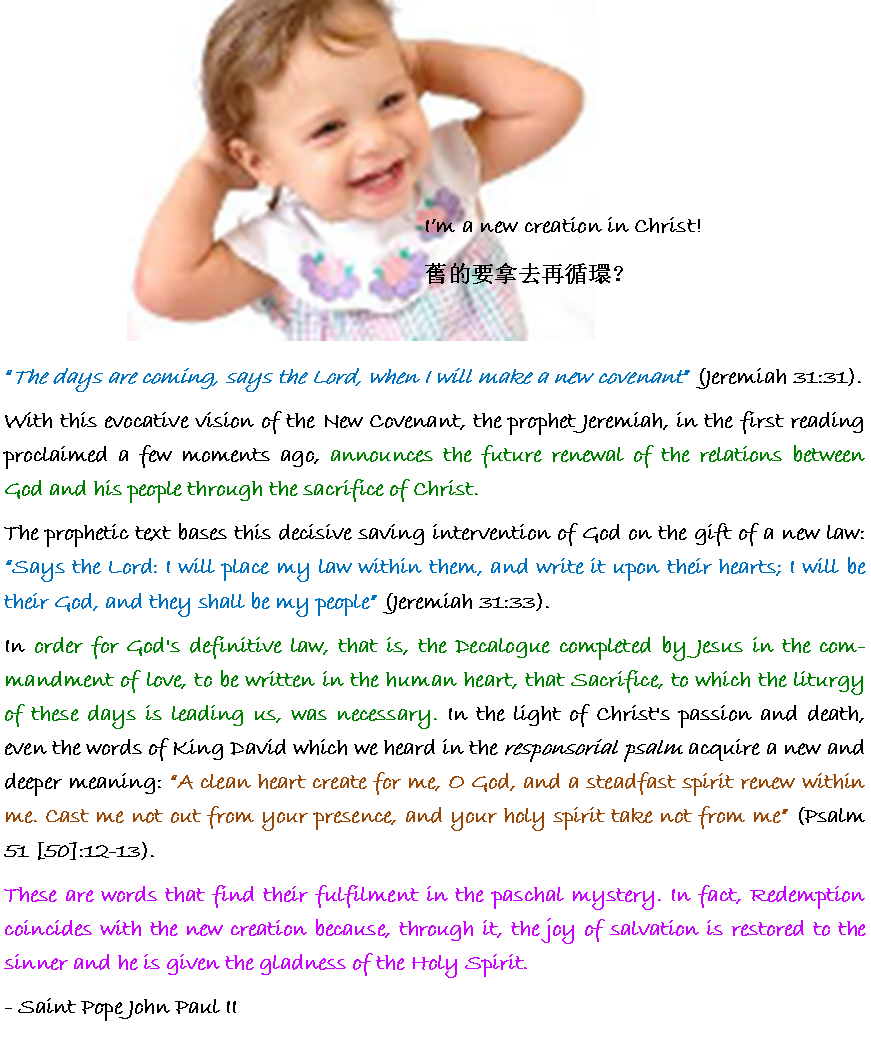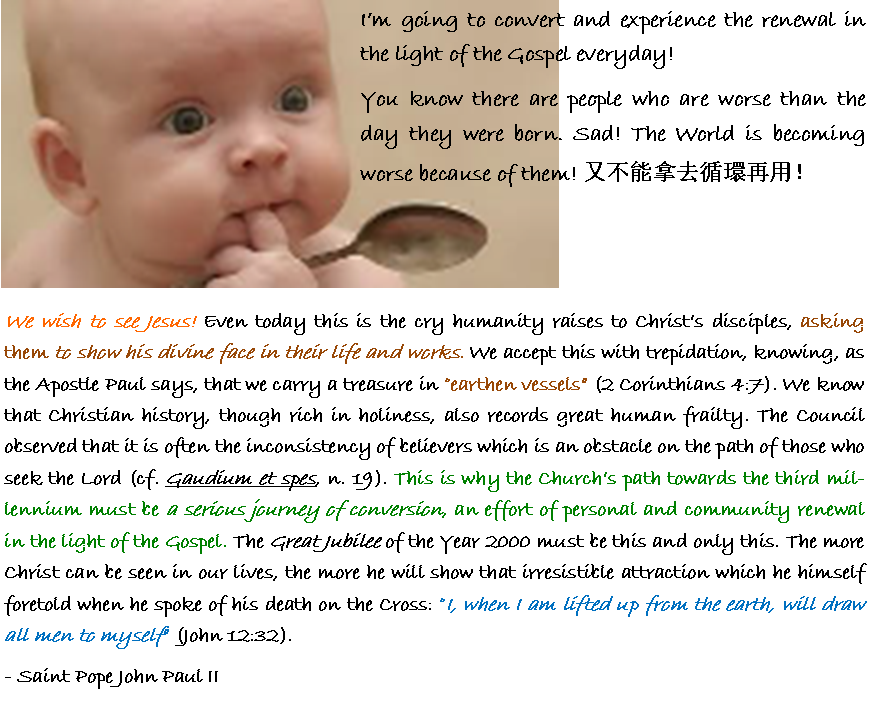|
168 |

|
Fifth Sunday of Lent, First Reading: Extracted from the Prophet Jeremiah 31:31-34 See, the days are coming – it is the Lord who speaks – when I will make a new covenant with the House of Israel (and the House of Judah), but not a covenant like the one I made with their ancestors on the day I took them by the hand to bring them out of the land of Egypt. They broke that covenant of mine, so I had to show them who was master. It is the Lord who speaks. No, this is the covenant I will make with the House of Israel when those days arrive – it is the Lord who speaks. Deep within them I will plant my Law, writing it on their hearts. Then I will be their God and they shall be my people. There will be no further need for neighbour to try to teach neighbour, or brother to say to brother, ‘Learn to know the Lord!’ No, they will all know me, the least no less than the greatest – it is the Lord who speaks – since I will forgive their iniquity and never call their sin to mind. |

|
Fifth Sunday of Lent, Responsorial: Psalm 51:3-4,12-15 Response: A pure heart create for me, O God.
Have mercy on me, God, in your kindness. In your compassion blot out my offence. O wash me more and more from my guilt and cleanse me from my sin.
A pure heart create for me, O God, put a steadfast spirit within me. Do not cast me away from your presence, nor deprive me of your holy spirit.
Give me again the joy of your help; with a spirit of fervour sustain me, that I may teach transgressors your ways and sinners may return to you. |

|
Fifth Sunday of Lent, Second Reading: Extracted from the Sermon: Hebrews 5:7-9 During his life on earth, Christ offered up prayer and entreaty, aloud and in silent tears, to the one who had the power to save him out of death, and he submitted so humbly that his prayer was heard. Although he was Son, he learnt to obey through suffering; but having been made perfect, he became for all who obey him the source of eternal salvation.
Gospel Acclamation John 12:26 Glory to you, O Christ, you are the Word of God! Whoever serves me must follow me, says the Lord; and where I am, there also will my servant be. Glory to you, O Christ, you are the Word of God! |

|
Fifth Sunday of Lent, Gospel Reading: Extracted from the holy Gospel according to Saint John 12:20-33 Among those who went up to worship at the festival were some Greeks. These approached Philip, who came from Bethsaida in Galilee, and put this request to him, ‘Sir, we should like to see Jesus.’ Philip went to tell Andrew, and Andrew and Philip together went to tell Jesus. Jesus replied to them: ‘Now the hour has come for the Son of Man to be glorified. I tell you, most solemnly, unless a wheat grain falls on the ground and dies, it remains only a single grain; but if it dies, it yields a rich harvest. Anyone who loves his life loses it; anyone who hates his life in this world will keep it for the eternal life. If a man serves me, he must follow me, wherever I am, my servant will be there too. If anyone serves me, my Father will honour him. Now my soul is troubled. What shall I say: Father, save me from this hour? But it was for this very reason that I have come to this hour. Father, glorify your name!’ A voice came from heaven, ‘I have glorified it, and I will glorify it again.’ People standing by, who heard this, said it was a clap of thunder; others said, ‘It was an angel speaking to him.’ Jesus answered, ‘It was not for my sake that this voice came, but for yours. ‘Now sentence is being passed on this world; now the prince of this world is to be overthrown. And when I am lifted up from the earth, I shall draw all men to myself.’ By these words he indicated the kind of death he would die.
Sharing: It was the 5th Sunday of Lent on 22 March 2015. The Readings that were read in the Eucharistic Celebrations all over the world on the same day are shown above: 1st Reading: Jeremiah 31:31-34, Responsorial: Psalm 51:3-4, 12-15, 2nd Reading: Hebrews 5:7-9 & Gospel Reading: John 12:20-33. We have extracted the Homilies Blessed Pope John Paul II, Pope Benedict XVI & Pope Francis I based on the aforesaid Readings to share with you, so that you could similarly be encouraged: |

|
EUCHARISTIC CELEBRATION AT THE parish HOMILY OF POPE JOHN PAUL II Sunday, 16 March 1997
1. “Unless a grain of wheat falls into the earth and dies, it remains alone; but if it dies, it bears much fruit” (John 12:24).
With these words, today’s liturgy invites us to prepare for the season of the Lord's Passion, which we will enter next Sunday. Christ spoke them when some Greeks, who wished to approach him, asked Philip: “Sir, we wish to see Jesus” (John 12:21). Christ then delivered a speech whose contents at first glance seem difficult and obscure: “The hour has come for the Son of man to be glorified.... He who loves his life loses it, and he who hates his life in this world will keep it for eternal life” (John 12:23, 25).
Actually these words contain a summary of the essential meaning of the events of Holy Week. That “hour” in which the Son of man is to be glorified is the “hour” of his passion and death on the cross. Precisely in that “hour” the grain of wheat that has fallen into the earth, that is, the Son of God made man, will die to bear the priceless fruit of the redemption. In him death will lead to the triumph of life.
The Gospel passage proclaimed a few moments ago speaks of Jesus' fear on the threshold of the paschal mystery. “Now is my soul troubled. And what shall I say? ‘Father, save me from this hour’?” (John 12:27-28). This text seems almost to re-echo the prayer of Gethsemane, when Jesus, experiencing the drama of loneliness and fear, asks his Father to take away the chalice of suffering. At the same time, however, he agrees to fulfil his will. After having said: “Father, save me from this hour”, he immediately continues: “No, for this purpose I have come to this hour. Father, glorify your name” (John 12:27-28).
2. The second reading also speaks of the paschal mystery. It recalls how Christ “in the days of his flesh, ... offered up prayers and supplications, with loud cries and tears, to him who was able to save him from death, and he was heard for his godly fear” (Hebrews 5:7). We might wonder: in what way was Christ heard, if he who could have saved him allowed him to undergo the tragic experience of Good Friday?
Further on in the holy text we find the answer: “Although he was a Son, he learned obedience through what he suffered; and being made perfect he became the source of eternal salvation to all who obey him” (Hebrews 5:8-9). Christ was heard therefore as the Redeemer of the world, having become the source of eternal salvation for all who believe in him. This is made clear in the passage from St John: “If any one serves me, he must follow me; and where I am, there shall my servant be also” (John 12:26).
3. Dear brothers and sisters of the parish of San Salvatore in Lauro, I am pleased to be among you today, to celebrate the Lord's day. I cordially greet the Cardinal Vicar, the Auxiliary Bishop for this area, your parish priest, Fr Antonio Tedeschi, and those who assist him, including — for so many years now — Bishop Luigi De Magistris, Regent of the Apostolic Penitentiary. I greet the representatives of the various groups and associations that are active in this community and all of you, dear parishioners, who have wanted to be present at this celebration.
A special thought goes to the president, chaplain and members of the Pious Sodality of Piceno, to Archbishop Sergio Sebastiani and Bishop Elio Sgreccia, also to all the people from the Marches region who are present here, linked by deep ties of faith and cultural tradition to this ancient and beautiful church. This church is a testimony to centuries of history and, above all, to the ancient devotion to the Blessed Virgin of Loreto, so venerated here. I address a special thought to Cardinal Pietro Palazzini.
Dear friends, yours is a small parish situated in the historical centre of Rome, and like many others surrounding you, in its pastoral activities it feels the effects of the phenomena typical of these city neighbourhoods, such as the lack of new families and young people, the reduced number of residents caused by the high cost of housing and by the numerous shops and offices that have gradually replaced it, the scattering of the faithful in the many neighbouring churches of the city centre. All this almost inevitably affects the parish's pastoral care. While it is necessary to continue the ordinary services for the few residents in the area who are involved in keeping the characteristics of old Rome alive, and to provide human and spiritual assistance to all those who serve the families in the area, you must commit yourselves to a renewed pastoral care that responds in an increasingly suitable way to the new requirements of the area.
4. I am thinking, for example, of what you already admirably do when you host arts and crafts fairs and other similar displays, which appeal to a large number of people in the parish territory. Keeping your beautiful church always open even in the evening so that it can welcome visitors up to a late hour, offering them the chance to participate in a carefully-prepared liturgy and to receive the sacrament of Reconciliation, is a practical, effective way to evangelize.
On the occasion of the Great Jubilee of the Year 2000, the centre of Rome will be visited by many pilgrims. Having the opportunity to visit churches that are hospitable and ready to offer special spiritual and cultural experiences will be an important occasion for meeting the Church in Rome, and for the faithful of the city it will be a stimulus to create new ways of proclaiming the Gospel, undertaking that widespread missionary work that the city mission is increasingly meant to be. I am also aware that you are moving in this direction in your parish. May the city mission, which already spurs you to work together in pastoral zones, help and foster the efforts you are making for an increased and more incisive evangelizing presence in Rome.
5. “The days are coming, says the Lord, when I will make a new covenant” (Jeremiah 31:31).
With this evocative vision of the New Covenant, the prophet Jeremiah, in the first reading proclaimed a few moments ago, announces the future renewal of the relations between God and his people through the sacrifice of Christ.
The prophetic text bases this decisive saving intervention of God on the gift of a new law: “Says the Lord: I will place my law within them, and write it upon their hearts; I will be their God, and they shall be my people” (Jeremiah 31:33).
In order for God's definitive law, that is, the Decalogue completed by Jesus in the commandment of love, to be written in the human heart, that Sacrifice, to which the liturgy of these days is leading us, was necessary. In the light of Christ's passion and death, even the words of King David which we heard in the responsorial psalm acquire a new and deeper meaning: “A clean heart create for me, O God, and a steadfast spirit renew within me. Cast me not out from your presence, and your holy spirit take not from me” (Psalm 51 [50]:12-13).
These are words that find their fulfilment in the paschal mystery. In fact, Redemption coincides with the new creation because, through it, the joy of salvation is restored to the sinner and he is given the gladness of the Holy Spirit.
As we are now hastening towards the passion, death and resurrection of the Lord, let us make our own the prayer of the prophet David:
Lord give us too the joy of being saved; a generous heart sustain in all your faithful.
Renew the steadfastness of our spirit, so that we can teach your ways to our brothers and sisters (cf. Psalm 51 [50]:13-14) and that everyone may return to you and enjoy together the fruits of your Redemption.
Amen. |

|
JOHN PAUL II ANGELUS Sunday, 16 March 1997
Dear Brothers and Sisters,
1. In the Gospel for this Fifth Sunday of Lent, Jesus illustrates the meaning of his death by using the image of a grain of wheat which, by dying, bears much fruit (cf. John 12:24).
The idea for this reflection was offered by the fact that among the crowds who had come to meet him as he drew near to Jerusalem were some foreigners, Greeks to be precise, who told the Apostles of their desire to see him: “We wish to see Jesus” (John 12:21). With these words, in a way, they become the spokesmen of all humanity, highlighting the universal value of the salvation offered by Christ.
2. We wish to see Jesus! Even today this is the cry humanity raises to Christ’s disciples, asking them to show his divine face in their life and works. We accept this with trepidation, knowing, as the Apostle Paul says, that we carry a treasure in “earthen vessels” (2 Corinthians 4:7). We know that Christian history, though rich in holiness, also records great human frailty. The Council observed that it is often the inconsistency of believers which is an obstacle on the path of those who seek the Lord (cf. Gaudium et spes, n. 19). This is why the Church’s path towards the third millennium must be a serious journey of conversion, an effort of personal and community renewal in the light of the Gospel. The Great Jubilee of the Year 2000 must be this and only this. The more Christ can be seen in our lives, the more he will show that irresistible attraction which he himself foretold when he spoke of his death on the Cross: “I, when I am lifted up from the earth, will draw all men to myself” (John 12:32).
3. Lord Jesus, give peace to the world!
Once again, dear brothers and sisters, I invite you to implore the Lord for peace in Albania. The crisis shaking that nation, which has only recently emerged from a long period of inhuman dictatorship, has now extended to the whole territory, immersing those dear people in total insecurity.
For the good of Albania, I ask all those who have taken up arms to lay them down: destructive violence is certainly not a suitable way to resolve social problems. On the contrary, may each individual feel obliged to co-operate, with respect for persons and the law, in re-establishing trust between the citizens and their authorities. None of this can happen without public order.
Of course, these tragic events call for a response from all of Europe: it must help the authorities and people of Albania to build their country on the basis of democracy and on political and social dialogue.
May the Blessed Virgin Mary, Our Lady of Good Counsel, intercede for us so that the force of arms may not gain the advantage over peace, and indifference may not prevail over solidarity! ----------------------------------------------------------
After praying the Angelus, the Holy Father said:
In a special way I now address the young people of Rome, inviting them to a meeting I have with them every year before Palm Sunday. Dear young people of Rome, I will be expecting you in large numbers next Thursday, at 5.00 p.m. in Paul VI Auditorium in the Vatican. During this meeting, entitled “Mission: pass the word”, I will give you Mark’s Gospel, so that it may become your plan of life, and so that you can go and bravely proclaim it to your peers. It will also be a good opportunity to prepare together for the great meeting with young people from all over the world to be held in Paris next August.
I also greet the many athletes involved today in the Rome Marathon: may this sporting event help to spread those values of love of sacrifice and solidarity which make the world more welcoming and human.
The Holy Father then said in Polish:
I now address the shipyard workers in Gdañsk. I wish to tell you that just as my heart and prayers were with you when you struggled for freedom, so now I am with you and your families in your struggle for survival.
I pray God that your efforts to preserve this symbol of the historic struggles and sacrifices made in defence of the dignity of man and the nation may be fruitful.
May Mary Help of Christians help all who are experiencing the crisis of an uncertain future. |

|
HOMILY OF THE HOLY FATHER BEATIFICATION OF 5 SERVANTS OF GOD Sunday, 9 April 2000
1. "We wish to see Jesus" (John 12: 21).
This is the request made to Philip by some Greeks who went up to Jerusalem for the Passover. Their desire to meet Jesus and to hear his word prompts a solemn response: "The hour has come for the Son of man to be glorified" (John 12: 23). What is this "hour" to which Jesus refers? The context explains it: it is the mysterious and solemn "hour" of his Death and Resurrection.
To see Jesus! Like that group of Greeks, countless men and women down the centuries have desired to know the Lord. They have seen him with the eyes of faith. They have recognized him as the crucified and risen Messiah. They have let themselves be won over by him and have become his faithful disciples. They are the saints and blesseds whom the Church holds up to us as models to imitate and examples to follow.
In the context of the Holy Year celebrations, today I have the joy of raising several new blesseds to the glory of the altars. They are five confessors of the faith who proclaimed Christ in word and bore witness to him in continual service to their brethren. They are Mariano de Jesús Euse Hoyos, a diocesan parish priest; Francis Xavier Seelos, a professed priest of the Congregation of the Most Holy Redeemer; Anna Rosa Gattorno, a widow, foundress of the Institute of the Daughters of St Anne; Mary Elisabeth Hesselblad, foundress of the Order of the Sisters of the Most Holy Saviour; and Mariam Thresia Chiramel Mankidiyan, foundress of the Congregation of the Holy Family in India.
May his shining witness of charity, understanding, service, solidarity and forgiveness be an example in Colombia and also an effective help in continuing the work of peace and full reconciliation in this beloved country. If 9 April 52 years ago marked the beginning of violence and conflicts, which unfortunately are still going on, may this day of the Great Jubilee year mark a new phase in which all Colombians will build a new Colombia together, one based on peace, social justice, respect for all human rights and brotherly love among children of the same homeland.
3. "Give me again the joy of your help; with a spirit of fervour sustain me, that I may teach transgressors your ways and sinners may return to you" (Psalm 51: 14-15). Faithful to the spirit and charism of the Redemptorist Congregation to which he belonged, Fr Francis Xavier Seelos often meditated upon these words of the Psalmist. Sustained by God's grace and an intense life of prayer, Fr Seelos left his native Bavaria and committed himself generously and joyfully to the missionary apostolate among immigrant communities in the United States.
In the various places where he worked, Fr Francis Xavier brought his enthusiasm, spirit of sacrifice and apostolic zeal. To the abandoned and the lost he preached the message of Jesus Christ, "the source of eternal salvation" (Hebrews 5: 9), and in the hours spent in the confessional he convinced many to return to God. Today, Blessed Francis Xavier Seelos invites the members of the Church to deepen their union with Christ in the sacraments of Penance and the Eucharist. Through his intercession, may all who work in the vineyard for the salvation of God's people be encouraged and strengthened in their task.
With complete trust in Providence and motivated by a courageous impulse of charity, Bl. Anna Rosa Gattorno had one desire: to serve Jesus in the suffering and wounded limbs of her neighbour, with sensitivity and motherly attention to all human misery.
Today the special witness of charity left by the new blessed is still a stirring encouragement for everyone in the Church who is committed more specifically to proclaiming the love of God, who heals the wounds of every heart and offers the fullness of immortal life to all.
5. "When I am lifted up from the earth, I shall draw all men to myself" (John 12: 32). The promise of Jesus is wonderfully fulfilled also in the life of Mary Elisabeth Hesselblad. Like her fellow countrywoman, St Bridget, she too acquired a deep understanding of the wisdom of the Cross through prayer and in the events of her own life. Her early experience of poverty, her contact with the sick who impressed her by their serenity and trust in God's help, and her perseverance despite many obstacles in founding the Order of the Most Holy Saviour of St Bridget, taught her that the Cross is at the centre of human life and is the ultimate revelation of our heavenly Father's love. By constantly meditating on God's word, Sr Elisabeth was confirmed in her resolve to work and pray that all Christians would be one (cf. John 17: 21).
She was convinced that by listening to the voice of the crucified Christ they would come together into one flock under one Shepherd (cf. John 10: 16), and from the very beginning her foundation, characterized by its Eucharistic and Marian spirituality, committed itself to the cause of Christian unity by means of prayer and evangelical witness. Through the intercession of Bl. Mary Elisabeth Hesselblad, pioneer of ecumenism, may God bless and bring to fruition the Church's efforts to build ever deeper communion and foster ever more effective cooperation among all Christ's followers: ut unum sint.
6. "Unless a wheat grain falls on the ground and dies, it remains only a single grain; but if it dies it yields a rich harvest" (John 12: 24). From childhood, Mariam Thresia Mankidiyan knew instinctively that God's love for her demanded a deep personal purification. Committing herself to a life of prayer and penance, Sr Mariam Thresia's willingness to embrace the Cross of Christ enabled her to remain steadfast in the face of frequent misunderstandings and severe spiritual trials. The patient discernment of her vocation eventually led to the foundation of the Congregation of the Holy Family, which continues to draw inspiration from her contemplative spirit and love of the poor.
Convinced that "God will give eternal life to those who convert sinners and bring them to the right path" (Letter 4 to her Spiritual Father), Sr Mariam devoted herself to this task by her visits and advice, as well as by her prayers and penitential practice. Through Bl. Mariam Thresia's intercession, may all consecrated men and women be strengthened in their vocation to pray for sinners and draw others to Christ by their words and example.
7. "I will be their God, and they shall be my people" (Jeremiah 31: 33). God is our only Lord and we are his people. This indissoluble covenant of love between God and humanity was brought to its fulfilment in Christ's paschal sacrifice. It is in him that, despite belonging to different lands and cultures, we become one people, one Church, one and the same spiritual building whose bright and solid stones are the saints.
Let us thank the Lord for the splendid witness of these new blesseds. Let us look to them, especially in this Lenten season, in order to be spurred in our preparation for the forthcoming Easter celebrations.
May Mary, Queen of Confessors, help us to follow her divine Son as did the new blesseds. May you, Mariano de Jesús Euse Hoyos, Francis Xavier Seelos, Anna Rosa Gattorno, Mary Elisabeth Hesselblad, Mariam Thresia Chiramel Mankidiyan, intercede for us so that by deeply sharing in Christ's redemptive Passion we can live the fruitfulness of the seed that dies and be received as his harvest in the kingdom of heaven. Amen!
JOHN PAUL II ANGELUS Sunday, 9 April 2000
1. At the end of this celebration, I would once again like to greet and thank everyone who has come to pay homage to the five new blesseds, one of whom is an Italian, Blessed Anna Rosa Gattorno. I hope that the religious of the institute she founded and all who share our rejoicing today will draw abundant fruit from the spiritual heritage left us by this faithful disciple of the Lord, who was always ready to serve her poor and suffering brothers and sisters.
2. I extend a special greeting to the pilgrims present for the beatification of Mary Elisabeth Hesselblad, Francis Xavier Seelos and Mariam Thresia Mankidiyan, especially those from Sweden, Germany, the United States and India. Through the intercession of the new beati, may you be strengthened in your faith and in Christian living.
I also extend a cordial greeting to the German-speaking pilgrims. Blessed Francis Xavier Seelos was born at Füssen in the Allgäu and was educated by the Benedictines in Augsburg. Swabia was thus the native soil of his faith. May the new blessed also encourage you to risk the adventure of faith.
3. With great affection I now address the Colombian pilgrims who have come for the beatification of Fr Mariano de Jesús Euse Hoyos. I greet the Cardinals, Bishops and priests who have accompanied the large pilgrimage. Through Fr Marianito's intercession may Colombians see their right to peace respected, the basis on which the development of all other rights depends. May God bless Colombia with peace!
4. As we thank the Lord for these generous Gospel witnesses, I would like to add a few words about two initiatives of solidarity. The first is the World Campaign for Elementary Instruction, a good that millions of children unfortunately still lack. I hope that the international community's efforts will soon achieve the goal of providing basic education for all minors. Secondly, I join the appeal of the Italian health authorities for blood donations and hope that people's commitment to such a human and evangelical way of helping our neighbour in need will be more and more generous.
May Mary, Queen of All Saints, guide and support us all on our Lenten journey to Easter, which is now close.
10 May 2015, 15:00 SGT |